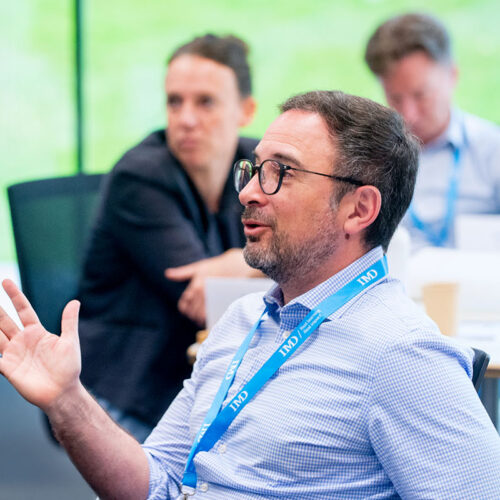IMD business school for management and leadership courses

Supply chain
Leading global operations through complexity and change: Magdi Batato
Published April 29, 2025 in Supply chain • 4 min read
Magdi Batato, former Executive Vice President, Head of Operations, and executive board member at Nestlé, has spent over three decades shaping global supply chains and operations in one of the world’s largest food and beverage companies. Now serving as IMD Executive in Residence and advising companies including BCG and o9 Solutions, he explains how supply chain leadership must evolve in an increasingly complex business environment.
In our 2025 IMD Global Supply Chain Survey, we highlight the specific challenges leaders face when transforming supply chains today. To complement the 2025 survey, we have interviewed leaders in the field to get their insights on best practice in a complex and changing environment.
Today, we need to holistically manage a supply ecosystem: adaptive, integrated, and built on trust-based partnerships.
Supply chain as a strategic pillar of business continuity
Magdi Batato reflects on how operations and supply chain management were once viewed narrowly – as a back-office function centered on procurement, logistics, and manufacturing, often targeted for outsourcing in the pursuit of efficiency. “The role of supply chain has progressed from a transactional support function to a strategic pillar of business continuity and long-term value,” he notes.
He stresses the need to rethink the language we use. “It’s no longer a ‘chain.’ Chains are linear and rigid. Today, we need to holistically manage a supply ecosystem: adaptive, integrated, and built on trust-based partnerships.”
Batato notes that this shift was particularly visible during the COVID-19 pandemic when Nestlé’s operational resilience enabled it to maintain its supply and support external partners with new requests. “Resilience isn’t about stockpiling. It’s about an integrated system that continues to deliver, even under pressure.”
Enhancing forecasting with digital transformation
While Nestlé was an early adopter of automation and robotics, today’s challenge remains in broader digital integration. Advanced artificial intelligence, the Internet of Things, big data, and digital twins have become more accessible and offer opportunities to further enhance forecasting and end-to-end visibility. “Consumers are not unpredictable,” says Batato. “The more connected we are to real-time data, the more precise and efficient our decisions will become.”
Still, he cautions against fragmented efforts. “Technology only creates value when embedded into an overall operating model. Running digital initiatives in isolation or parallel to core processes, like SKU rationalization, limits their impact.”

On campus program
Strategic Supply Chain Leadership
Resilience through collaboration
Having led global operations and supply chains through multiple cycles of disruption, Batato is clear: resilience is built through collaboration, not independence. “Agility can’t be achieved in silos. It depends on aligned goals and shared information – across internal functions and with external partners.”
Ongoing sustainability efforts are an example. You can’t drive lower emissions by pressuring suppliers – true progress only comes from collaboration. It’s about co-investing in solutions, aligning incentives, and tackling challenges together.
Batato extends his philosophy of collaboration and agility to talent development, acknowledging that the younger generation is less likely to stay loyal to one company. “Career development today requires broader exposure, not just upward progression,” he says. The best people seek roles that offer diverse experiences and opportunities for growth. At Nestlé, he introduced flexible, mission-based roles, allowing employees to contribute across multiple functions and solve meaningful problems.
Be proud of reliability but remain constructively dissatisfied, i.e., we don’t need more cheerleaders, we do need more performance-oriented leaders.
Reflections for supply chain leaders and guidance for the next generation
Drawing on his experience in leading complex supply chain efforts and organizations across many geographies, Batato shares three pieces of advice for today’s supply chain leaders:
- Recognize that you don’t know it all. Deep operational expertise is essential, but leadership also requires understanding the challenges and language of adjacent functions – from sales to R&D.
- Operations is a service to the business. Leaders must focus on enabling performance, not simply managing it. “Be proud of reliability but remain constructively dissatisfied, i.e., we don’t need more cheerleaders, we do need more performance-oriented leaders.”
- Recognize and reward collaboration. Sustainable transformation happens when KPIs reflect shared outcomes, not isolated targets. “Integration and collaboration with other functions earn you a seat at the table.”
Expert

Magdi Batato
Former COO, CEO for Pakistan and Afghanistan, and executive board member at Nestlé
Related

Training the retailers of tomorrow
May 30, 2025 in Consumer Goods
Natalia Wallenberg of Ahold Delhaize describes how one of the largest retailers in Europe is tackling the upskilling dilemma....

CR Beer’s bold bet: refreshing China’s biggest brewery
May 13, 2025 • by Mark J. Greeven, Sophie Liu, Wei Wei in Consumer Goods
How CR Beer, the brewer of Snow beer and the exclusive Chinese partner of Heineken, redefined its legacy by shifting from mass‑market volume to premium innovation and Baijiu diversification under the bold...

Circular leadership: Ilaria Resta’s vision for Audemars Piguet
April 25, 2025 in Consumer Goods
Audemars Piguet CEO Ilaria Resta is placing circular leadership at the heart of her transformation strategy – bringing a bold, human-centered approach to one of Switzerland’s most storied watch brands, blending tradition...